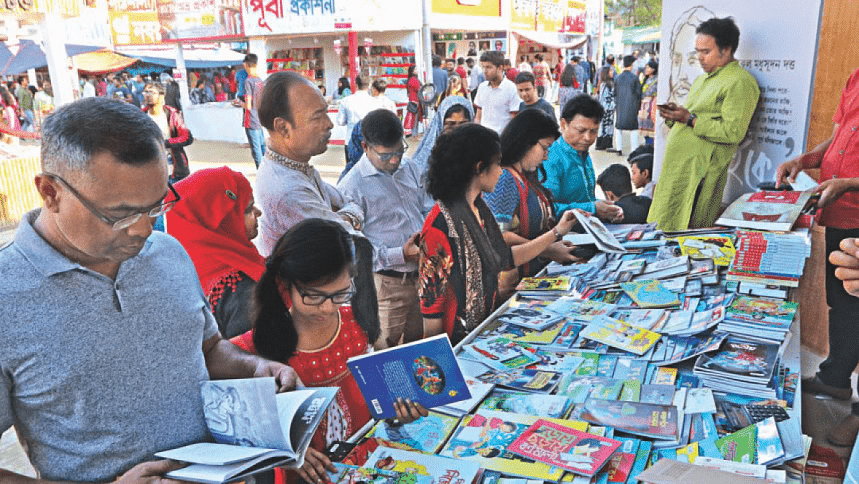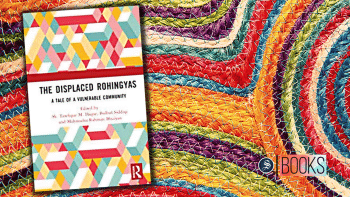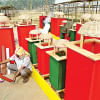Turning the pages of Ekushey Boi Mela

A big portion of my childhood had passed being enchanted over Amar Ekushey Boi Mela. Much like every other bibliophile, I too used to wait for February only for the sake of a month-long celebration of books. As a self-proclaimed bookworm, my fascination for new books never ceases, rather, it grew over the years. However, I have to confess that my passion for Boi Mela became hazy over the years as I was growing up. Being from the outskirts of Dhaka and a child meant a very slim possibility of me visiting Boi Mela frequently, let alone more than once in a single year. So, my visits used to be brief, yet heavy. Heavy, in literal terms, with bags full of books, stocked for an entire year, which ironically I was done reading within a month or two.
As a long period of time has passed; my tiny life shifted geographically closer to but emotionally further from Boi Mela. Boi Mela, too, grew from its place of origin—from Bangla Academy to Suhrawardy Udyan, with more room for more stalls and more visitors. In almost a decade, I hardly got the chance to visit Boi Mela and appease my desire for collecting books from the heart of Bangladeshi literature. I think, since the comfort of ordering books and getting delivered within a short time started to please my introverted personality, the need of waiting to go to physical bookshops or Boi Mela, started to fade. For convenience and time management, I kept prioritising online bookshops over Boi Mela, completely cutting off the romanticism of the biggest book fair of the country from my life.
This year, the internet graciously presented me with a news headline hinting that Boi Mela might shift to another place, once again, which finally urged me to visit the fair in an attempt to rekindle the bygone Boi Mela days. But in the last few years, I realised that the older I grew, the more selective I had become about what I read. This tormented me during my visit there after so many years.
In simple words, I didn't feel how I used to feel as a child reader. I almost felt envy of the children around me, revelling in the festive ambiance. All I wanted to do the entire time I was at Boi Mela was to rediscover the publications I used to search for in my childhood—to go through the juvenile detective novels, chilling horrors, and all the books for young readers. In the end, I ended up with a stack of serious non-fictions written on history, sociology, anthropology, which my younger self would've definitely identified as boring.
I realised that over the years, it was the very essence of Boi Mela that had changed. Things went far from just books to many other activities and commodities. Did you even visit Boi Mela if you didn't get hawkers flattering you to buy a flower band or tiara from them or someone trying to get you to buy their pin or badge or some other little souvenir? I remembered the one time, as a child, an old man had grabbed my small hand to paint Bangla alphabets on it and how scared I was in those 20 seconds of a random encounter. Again, after years in 2024, I encountered some smiling men trying to convince me to get one of their pins and I, with a bigger, better, jollier smile, rejected their persuasion. Revenge taken.
The fact remains, however, that the constant discussion on social media, heated debates on Boi Mela related issues over the past few years had clouded my judgement of the fair. Boi Mela 2024, mercifully, made me experience a profound paradigm shift in Bangla literature and the current trends of Boi Mela. Yes I saw the Boi Mela turning into a social media prop; I also won't deny the other complaints the public seem to have about the quality, but I also can't deny that Ekushey Boi Mela is still as magnetic for me as it used to be. Even after almost a decade, I felt the same while getting out through the exit gate—I wished to stay longer, explore more, buy more. It reminded me once again that there was no mightier gathering and extensive collection and promotion of Bangladeshi literature.
Boi Mela is more than a clickable link we see on our phone screens; it is more than the controversies and public debates. Boi Mela is a place of emotion and pride for readers, and I will always strive to keep going back to this literary haven.
Dola Saha struggles to manage her co-author named procrastination. Ask her to fire him at [email protected].

 For all latest news, follow The Daily Star's Google News channel.
For all latest news, follow The Daily Star's Google News channel. 











Comments